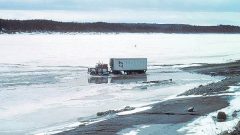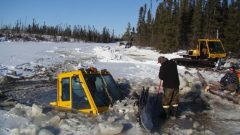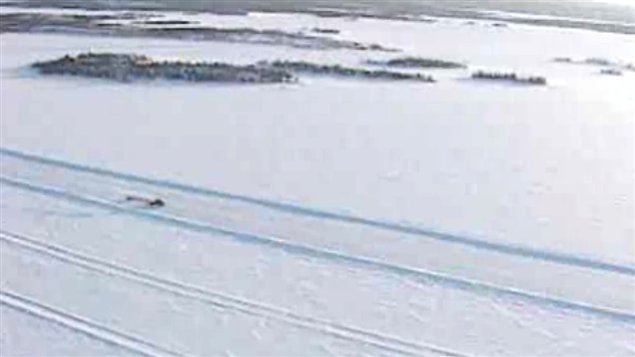While most ice studies in the Arctic have been focused on the lessening sea ice, a new study looks at lakes in the Arctic and how warming and climate change is affecting them.

Researcher Claude Duguay of the University of Waterloo stands on the ice of an Arctic lake in Alaska. His research group has found the ice season in Arctic lakes is 24 days shorter than 50 years ago and peak ice thickness has thinned significantly. (Claude Duguay-University of Waterloo)
Researchers at the University of Waterloo in Ontario, have looked at the situation regarding fresh water in the north for the period 1950 to 2011. The study was published this month in the journal “Cryosphere”.
They found the winter season is now almost a month shorter (24 days) than it was 5 decades ago.
Analyzing satellite radar imagery from the European Space Agency from more than 400 lakes and water beds in Alaska’s North Slope, they found that even as recently as 1992, 62 percent of the lakes froze completely to the bottom, but by 2011, that number had been reduced to a mere 26 percent.

A heavy truck takes a risk to cross a deterioting ice road near Ft Simpson NWT.
(Terry D Prowse-NRCAN)
They also found that at the coldest point of 2011, lake ice was as much as 38 centimetres thinner than at the same period in 1950.
Northern communities and remote mining operations are already noticing the effects of climate change on their operations.
Countries like Russia, Finland, Norway,Sweden, Greenland, USA (Alaska), and Canada depend on winter ice-roads over frozen lakes, rivers, ponds, muskeg and bog to bring supplies to remote areas.

An ice road worker died when his machine went through weak ice in northern Ontario. As climate warms, the season is getting shorter and predicting the ice safety more difficult (CBC)
In Canada there are well over 5,000 kilometres of ice-roads created each year for this purpose. Winter Ice roads are needed to bring in the heavy weight of equipment, fuel, groceries etc to the remote communities and sites.. The alternative is flying in goods which is completely impossible in many areas, and prohibitively expensive in those few cases where it might physically be possible.
Roads are created each year in northern parts of all provinces from Quebec to British Columbia and in all three territories. Ontario alone spends millions of dollars annually to create and maintain its ice roads to 30 remote communities that are otherwise only accessible by air.
Another study by American researchers from the University of California Los Angeles, found that as climate warms, the ability to create and use these ice-roads will become increasingly difficult.
“In Canada, in particular, we project about 400,000 square kilometres of area that … for climatic reasons, will no longer be suitable for winter roads,” said Scott Stephenson, a graduate student in geography at the University of California, Los Angeles, and lead author of the study published this week in Nature Climate Change.







For reasons beyond our control, and for an undetermined period of time, our comment section is now closed. However, our social networks remain open to your contributions.